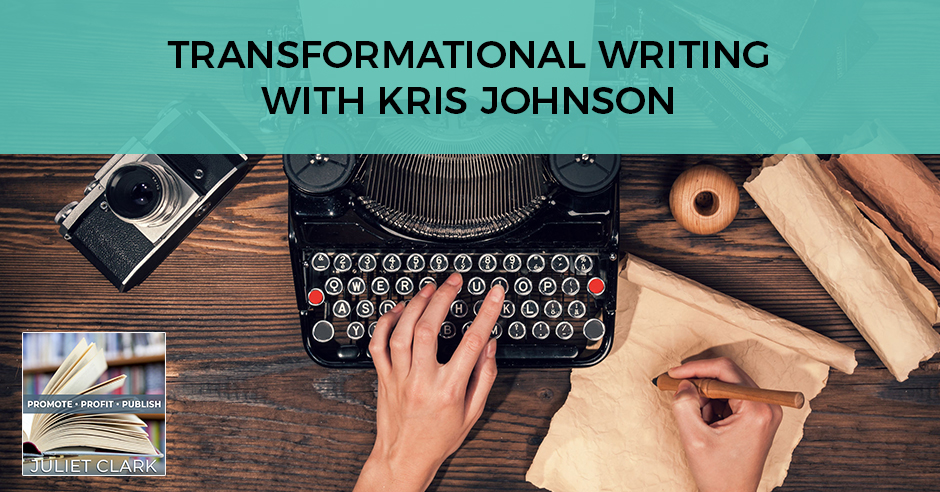
When writing their expert books, a lot of entrepreneurs and field experts make the mistake of discussing the process and how they do their business and their daily routine instead of focusing on the results and what the client needs really are. That causes problems for the writer because more often than not, it only makes sense to the actual person who wrote it. It’s not going to serve the purpose of elevating himself as an expert and actually giving value to the people who are reading it. Kris Johnson says transformational writing is all about building that connection between the reader and the writer. The world has changed so much and people want to know that they’re going to get an answer to their problem. Kris is a professional writer with an MFA, a credentialed teacher, and a writing coach. She talks about transformational writing and points out some of the biggest mistakes people make when writing their expert books.
—
Watch the episode here:
Listen to the podcast here:
Transformational Writing with Kris Johnson
I am excited to have one of my clients and one of my dear friends, Kristy Boyd Johnson. Kristy has ghosted over 21 books, nonfiction books at that, for a variety of businesses. She’s an Honors graduate of National University’s Professional Screenwriting Program with an MFA, an award-winning children’s book writer and a former teacher. She’s also an award-winning screenwriter. Kristy has combined her love of writing and teaching and formed her premier coaching business, the New Author Project to help entrepreneurs and small business owners develop their ideas into viable books. If you ever wanted to write a book, go to www.CrushYourExpertBook.com and take her quiz and see where you stand in the process. The process is everything in a book when you figure out what the mistakes are that people do. Welcome, Kristy. We’re going to talk about the big mistake that small business owners and entrepreneurs make when writing their expert books. That big problem is discussing the process instead of focusing on what the client needs are and the results. I agree with that 100% because I read books all the time where they tell us how they’re going to do that. They think it’s important because it’s different than how other people do it, but people don’t care. What they care about is, “Am I going to get results? Am I going to get benefits from this book?” Can you define what you mean by writers discussing the process and go deeper into that one?
Thanks, Juliet, for having me. I feel honored to be here and I appreciate it. You said it pretty well. When an author discusses their process, it literally means that they’re writing about their process, how they do their business or their daily routine. I thought of an example of a person. I worked with a chiropractor, we’ll call him Dr. X. He wanted to write a book to promote his business and then also elevate himself as an author, elevate himself to the level of expert. His first book that he brought me was all about how he works with the client when they come in, how gentle he is, how he finds out what needs adjusting and how he’s different with children, adults, elderly people or athletes. It was all about him. It was also a monster. I read a few pages and I was like, “It’s not going to work,” because nobody cares how you do it.
Stories are the best thing because they connect emotionally with the reader. Share on XThat causes problems for the writer because more often than not, that’s what you get. The book is a monster. It’s a long ramble. It doesn’t make much sense. It only makes sense to the actual person who wrote it. It’s not going to serve the purpose of elevating himself as an expert and giving value to the people who are reading or either his clients currently or potential clients. The reason is essentially that there’s no connection between the reader and the writer. When you read any book, whether it’s fiction or nonfiction, you have to feel connected. In fiction, generally you feel connected to the character. You’re rooting for him or you’re against him, but you’re connected to it. In nonfiction, you have to feel connected to the writer because the writer is writing something of value to the reader. If the reader doesn’t feel that, it doesn’t happen.
That’s the difference in marketing the two and why it’s much harder to market fiction. You have to have people fall in love with the characters before they know them, which is difficult sometimes. Nobody knows who they are until three, four, five books in. For me, it was my third book. It was difficult up until then. Why did they get sucked into that when they’re writing their expert books?
It’s because these people are in fact experts in their field. Their heads are full of all the information that they deal with every single day and has become pretty much second nature to them. That is a commendable thing. That is definitely a good thing that they have the knowledge, but it isn’t enough to show the world how much knowledge you have. They pretty much can figure if you have an MD behind your name or you’re a chiropractor. If you have any initials behind your name that establish credentials or you’ve been working in a field for a very long time, it’s pretty much a given that you’re an expert. The world has changed so much. The world has become this world of tweets and little short blurbs, Facebook posts and attention spans have dwindled, which is tying back to the monster book thing. That’s a big mistake. That’s another big booboo. It’s better for the author to take a very focused part of their business and focus all about on one thing.

Transformational Writing: When you read any book, whether it’s fiction or nonfiction, you have to feel connected.
In my chiropractor example, let’s say he goes, “One of the big problems that my audience has are migraines. Probably 70% of my clients have migraines.” If he chooses them to take that subject and talk not about how he fixes migraines but talks about it in terms of the client, how people suffer from this, maybe statistics on how many people suffer from it so that people can feel like they’re not alone. Weave in the stories of his real-life clients, testimonials, and examples. He can get a little bit in of, “With Jane Doe, I had to be very careful because she had a back injury where she broke her back, so her migraines came from that. Adjusting her was a little different than this athlete over here, who played football and gets migraines because he’s got damaged from playing football.” It depends.
The stories connect emotionally. Story is the best thing. It connects emotionally with the reader. It’s all about uplifting the reader to feel like, “That person got better, so maybe I can get better. Maybe I don’t have to spend three days on the floor with my head packed on ice. Maybe I could go to this person and start to feel better.” That same chiropractor then can go, “I’ve got this first book. Now I’m going to write about low back pain in my next book. I’m going to write about sciatica in my next book. I’m going to write a book specifically about athletes because that’s one of my big audiences, specific needs to athletes and how a chiropractor could help them with their performance.” He’s got four books. He’s got a huge amount of credibility because he’s passed that three-mark, he’s got four. It’s very simple to focus a topic and orient it all towards, “This is going to make you feel better. If you suffer from this, you will feel better and this is why.” That’s what people want. They want to know that they’re going to get an answer to their problem. They don’t care how you do it. They just want it to get fixed.
Focus on one thing that will transform the reader's life in a significant way. Share on XHere’s another reason why people get so into the process is we have a lot of people come to us and they’ve written a book because a coach told them to. We’ve had people come to us where they’ll say, “I’m stuck on Chapter Eight: Joint Ventures.” We’ll go, “Let’s get through that. Let’s help you.” We’ll hear something like, “I’ve never done one.” We have a lot of that going out there too where they get deep into the process because they don’t know what they’re doing the way they should. That’s probably one of the big downfalls in the expert space as well. You’ve got to have a book, but I don’t even have a practice. I don’t even have a business, so very weird. Explain transformational writing. How is that different?
Transformational writing literally means that you focus your book on the benefits to the client or the reader. It’s all about changing their lives in a significant way but at the same time, it’s only one significant way. There’s no way any expert out there in any field can put every ounce of information that they know about their business into one book. It becomes a monster. It becomes unreadable. It becomes all about them. It’s better to break it up. You focus on one thing that will transform the reader’s life in a significant way. Like with the chiropractor, writing a whole bunch of little smaller books, maybe about 75 pages give or take. Another benefit to the reader is that they go, “I’ve heard of Dr. X. I’ve heard about these books.”
They check out your list of books on Amazon or on your website and they go, “I don’t need migraines. I sit at the computer all day and I have terrible sciatica. I’m going to get that book.” They self-determine what they need, but the author has taken little pieces of, “Here’s how you can feel better,” knowing what they know from their business and made it into something that the reader can benefit from. The reader can go, “There are exercises in here that are exactly for sciatica.” They start doing them and maybe they start feeling better and they go, “I’m going to call this guy because that helped me. If I go to him, I could get rid of this.” That’s what you want. You want to build your clientele. That’s what expert books are for. It’s for the purpose of building up your business, establishing your credibility and authority as an expert in your field and elevating you above every other expert in the same field that’s out there. It doesn’t matter what it is. There’s always a bunch of people in that field.
I met someone back at an event. We’ve chatted for a few minutes and then I realized she had a book. I went and bought her book. I called her and I was like, “We need to have lunch.” I have to tell you it was a fabulous lunch. I told her that book right after I read it, I had a client that came to me and I was like, “I’ve got the perfect exercise for you.” I put her through the exercise that Lauren had in that book and it was pretty amazing. It happens. Can you give our audience a tip about how to avoid these traps?

Transformational Writing: Transformational writing literally means that you focus your book on the benefits to the client or the reader.
I have two tips because they’re so interrelated. Firstly, it’s helpful if the author writes the book in the second person. Meaning you like, “I’m talking to you. If you do this exercise, it will help your sciatica in this way. You should notice this difference within about a week,” or whatever the expert field is. A lot of people resist that because in school, teachers are like, “You never write in second person. You never say you and you never say I.” This isn’t school and it’s an expert book. The purpose of it is to reach an audience. That’s what connects because they feel like they’re being talked to. The second tip I have is focus on one thing, pick something. I have this little trick that I use with people. I tell them, “I want you to write a list of all the things you want to address in your book. Write a list.” They’ll write a list and they’ll come up to ten or twelve items. I say, “See how each one of those is a book.” They go, “What?” They think they don’t have a book in them, but they do. They usually have way more than one book in them. They don’t know it because they don’t know how to focus on it and tailor each book to a specific need.
Thank you so much. That was a lot of great information. You have a quiz and a community on Facebook. Let’s pump them both because I know you put a lot of work into building them both. Where can they find your community over on Facebook?
It’s Crush Your Expert Book on Facebook. Click join and there are three easy questions to answer. Each week, we have different days for different things. Wednesdays is I go Live. It’s tips or information that writers can use.
She has a Feedback Friday every week where you can put a paragraph of your work and she will critique for you. That’s super helpful. You have access to a professional writing coach. Where can they take the quiz and find out where these skills are at?
The quiz is at www.CrushYourExpertBook.com. Go there and take the quiz. It’s very quick, maybe five minutes. You’ll get an email back telling you where you stand and then we can go from there.
Thank you very much.
Important Links:
- Kristy Boyd Johnson
- New Author Project
- www.CrushYourExpertBook.com
- Crush Your Expert Book – Facebook
About Kris Johnson
 Kristy Boyd Johnson is an accomplished writer across multiply genres. She has a passion for writing children’s books with a light touch that leave you wondering about possibilities. She has ghostwritten over 20 non-fiction books, and now she helps entrepreneurs write their Expert Books. Additionally, Kristy is an Honors graduate of National University’s School of Professional Studies and holds an M.F.A. in Professional Screenwriting. Personally, Kristy is an avid reader, loves swimming and yoga and playing with her Improv group, and lives with her family in San Diego.
Kristy Boyd Johnson is an accomplished writer across multiply genres. She has a passion for writing children’s books with a light touch that leave you wondering about possibilities. She has ghostwritten over 20 non-fiction books, and now she helps entrepreneurs write their Expert Books. Additionally, Kristy is an Honors graduate of National University’s School of Professional Studies and holds an M.F.A. in Professional Screenwriting. Personally, Kristy is an avid reader, loves swimming and yoga and playing with her Improv group, and lives with her family in San Diego.
Love the show? Subscribe, rate, review, and share!









Leave A Comment